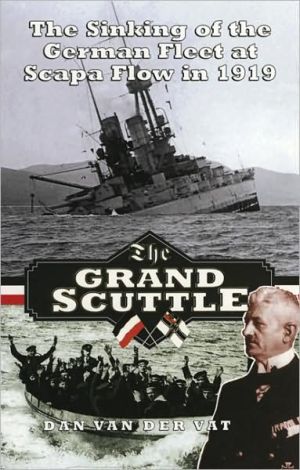(Ebook) The Grand Scuttle: The Sinking of the German Fleet at Scapa Flow in 1919 by Dan van der Vat ISBN 9781843410386, 1843410389
;The Grand Scuttle: The Sinking of the German Fleet at Scapa Flow in 1919 КНИГИ ;ВОЕННАЯ ИСТОРИЯ Название: The Grand Scuttle: The Sinking of the German Fleet at Scapa Flow in 1919Автор: Dan van der VatИздательство: BirlinnISBN: 1843410389Год: 2007Страниц: 240Формат: PDF в RARРазмер: 71.71МБЯзык: английскийOn June 21, 1919 occurred the greatest single loss of shipping since Man first sat astride a log and floated away from land. The Persian Fleet met its end at Salamis and the U.S. Pacific Fleet was smashed at Pearl Harbor, but both of these disasters resulted from enemy action. The Spanish Armada was scattered and destroyed, but the main reason for its doom was a big storm. The German High Seas Fleet survived a cataclysmic war almost unscathed, but the bulk of its strength and tonnage was destroyed by order of the German admiral in command at the time. The scale of loss, over 400,000 tons of the finest warships then in existence, 74 vessels of which 52 actually went to the bottom under the eyes of the enemy, is unique in itself. That it was an act of self-destruction based on a misapprehension compounds the uniqueness of the event.At the end of World War I, the German High Seas Fleet was sent to Scapa Flow in the north of Scotland for internment. The ships were demilitarized (i.e., all ammunition was off-loaded and all weapons were disabled) and swung at anchor while the Treaty of Versailles was being thrashed out. Skeleton German crews were on board and the Fleet was under the command of Rear Admiral Ludwig von Reuter. In mid-June 1919, Reuter, whose English was not good, read an article in The Times that the High Seas Fleet was to be parcelled out to the victorious powers. Rather than have that happen, he arranged for all the ships to be scuttled, and gave the order on June 21st.Unfortunately, The Times article was about options under discussion at Versailles. While the French, Japanese and Italians wanted some of the German ships, the British and Americans didn't want to upset the balance of naval power. The same day that Reuter had the Fleet scuttled, the British and Americans prevailed upon the other allies to have the ships scrapped.Van der Vat discusses the situation in Germany at the end of the war, what conditions were like on the ships interned in Scapa Flow, and how dislike and distrust of the Germans by the British caused the scuttle. He explains how the scuttle took place and how it caused the final casualties of the First World War. Van der Vat concludes by describing the decades long salvage of the High Seas Fleet. As a bit of trivia, fragments of the Kaiser's fleet are in demand for making scientific instruments and some small bits of the German ships are probably on the Moon.Скачать: Depositfiles UploadingHotfile 85
*Free conversion of into popular formats such as PDF, DOCX, DOC, AZW, EPUB, and MOBI after payment.


